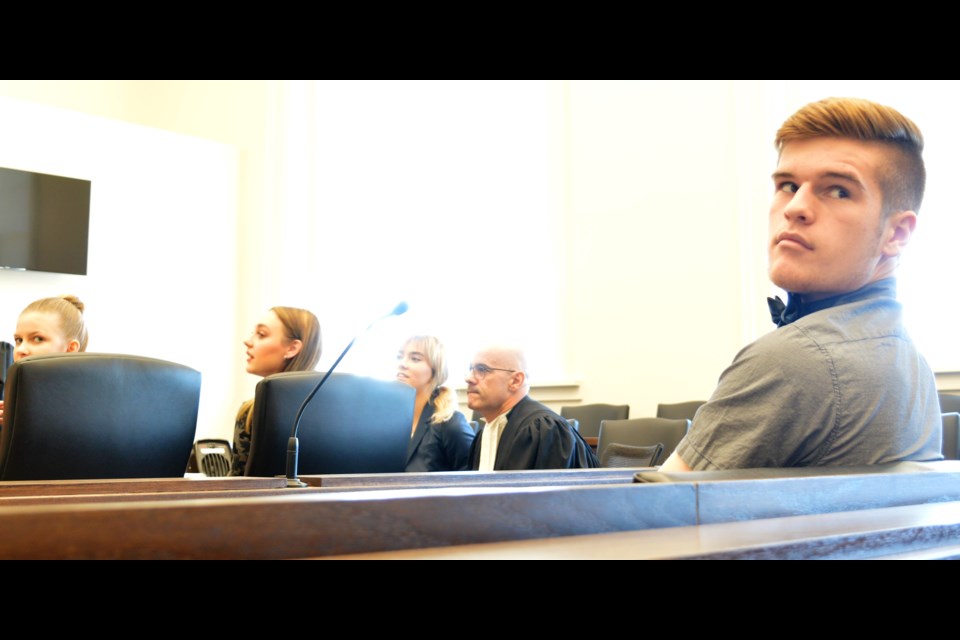After the jury read their verdict, there was plenty of debate inside the Saskatchewan Court of Queen's Bench about the nuances of the case.
Despite their being a guilty verdict, no one was going to jail. Rather, Central Collegiate's Law 30 class had just taken part in their annual mock jury trial and did so with some interesting and compelling legal arguments.
"It's been a great learning experience for these kids. There's a lot of them who have actually said after this that they think want to pursue a career in law," said Central's Cal Carter, who teaches the class.
This year's mock jury trial was held in the court and Justice Darin Chow presided with Senior Crown Prosecutor Rob Parker leading the prosecution and David Chow and Tim Hansen from Chow McLeod leading the defence.
There were four student lawyers on each side who either made arguments or questioned witnesses. Students also shadowed the sheriff and judicial officer Carol Meier and served as the witnesses who took the stand.
The accused was a Central student as were all 12 jurors and their two alternates.
"I am really proud of them. They've worked hard -- on both sides. There were some that I was impressed with how they stepped up. They were nervous, of course, and that sort of thing, but I was really proud of them. They did well," Carter said.
"We had comments from Judge Chow and from Carol (Meier) saying that the kids had really improved. They seem to be getting better as we go along."
In his closing remarks, Chow complimented the students on the work they had put in to the exercise.
Carter said he really appreciated the local legal community taking time out of their schedules to take part in the mock trial, to work with the students and also come in and speak to the class at various points.
"We've had the crown, both Mr. Parker and Mr. (Brian) Hendrickson and Tim McLeod," Carter said. "We've also had law students come in and talk to the class. We've had a lot of good class involvement at the school level and they've been really supportive of doing this program."
This is the fourth year Carter's class has done the mock jury trial and the third time they've been able to hold it in the court. Last year saw the Central law class squaring off against the Vanier law class which added another dimension to the proceedings.
The mock trials bring a lot of different skill sets to bear. The students need to use teamwork to research and form rational arguments while developing skills like public speaking, interviewing and extracting information on the stand.
"We've had little ones in class where they've gone up against each other and have had to partner and team up with different students," Carter said.
The class and the mock trial help teach students the law, but they also help demystify the legal process and show a more realistic depiction of the legal system than the students may be used to seeing on television or in the movies.
"I start off in my very first class telling them that you think this is going to be the Tom Cruise 'You can't handle the truth!' you're going to be sadly disappointed," Carter said. "There are a lot of people who are in law, who are lawyers, who don't actually see a court room. There's all different avenues and aspects of it. We try to take out the Hollywood glitz and glam of it.
"I take them to docket court, which can be boring, so they see how that works. We will usually go on a Monday when there has been maybe more arrests."
Unlike American procedural dramas on TV and in movies where much time and effort may be put into profiling potential jurors during the "voir dire" process, jury selection is quite simple in Canada. Both the crown and defence had the chance to say "content" or "challenge" and that was it. If a prospective juror was challenged, they were dismissed.
Justice Chow noted that if too many prospective jurors are dismissed and they don't have enough people to form a jury, the sheriff is tasked with going out onto the street and pulling people into the court to serve.
That being said, jury trials are fairly rare at the Queen's bench level and Justice Chow noted that while the perception is that jury trials are preferable to the accused, he hasn't always found that to be the case.
Unlike in a real trial, the jury in the mock trial was asked to discuss the reasons for their decision with the legal teams, which led to even more debate about the case.
The case was part of the curriculum and was complex and nuanced. The "accused" -- senior Ethan Johnson -- was charged with unauthorized possession of firearm and pointing a firearm.
The back story was that the accused was throwing a party when his neighbour asked him to turn down the music. Guns were drawn by other party-goers, the lights went out and shots were fired. The victim said the accused pointed a gun at him, while the accused alleged that he had a gun given to him and he dropped it as soon as he realized what it was. There was a gun found in the apartment, under a couch, that had not been fired, wasn't loaded and didn't have the accused's fingerprints on it.




